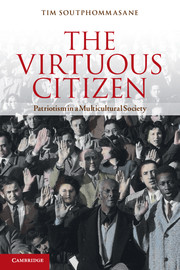4 - Liberal nationalism as cultural nationalism
Published online by Cambridge University Press: 05 November 2012
Summary
Affirming a national mode of patriotism would lend a particular character to the public dialogue essential to any negotiation of cultural diversity. If citizens’ collective identity involved a national identity, the dialogue would have a common national culture as its focus. The demand for patriotic solidarity would thus be met to the extent that citizens felt they belonged to a particular national community, while the demand for cultural recognition would be met to the extent that a particular national identity was flexible enough to incorporate diverse cultural groups.
In this chapter, I evaluate the arguments made by ‘liberal nationalists’ who propose that a liberal society requires a shared national identity among its citizens to motivate support for democratic projects. The liberal nationalist position attempts to reconcile multiculturalism and patriotism, first by reframing some of the ways in which the demands for cultural recognition cut against the conditions of political solidarity, and vice versa. By addressing the prior constitution of the political community as a national community, liberal nationalism effectively converts patriotism into solidarity at the level of the nation. Hence, where multiculturalism undermines a sense of fellow feeling among citizens (a multiculturalism-generated clash), it does so because it undermines a common national identity; where there is a patriotic imposition of identity (or a patriotism-generated clash), it concerns the unjust privileging of a national identity. Second, the liberal nationalist view posits that a national culture will be constituted by belief among its members and will necessarily involve debate about its content. That a national culture will be regulated by an ideal of deliberative democracy means that all citizens can participate freely in contesting and reflecting upon the meaning of the national identity. In these two ways, a national mode of citizenship transforms the public dialogue prompted by cultural diversity into a ‘national-cultural’ dialogue. The reference points for intercultural evaluation shift from a political community's shared civic values to its underlying national identity. And the dialogue then becomes explicitly about the expression and interpretation of the community's national culture.
- Type
- Chapter
- Information
- The Virtuous CitizenPatriotism in a Multicultural Society, pp. 70 - 102Publisher: Cambridge University PressPrint publication year: 2012



